
-
The Land of Fire
Where does the Myth of Prometheus start? The story ends in the peak of Shkhara in Georgia, where he got the punishment for stealing the fire of the Gods and giving it to humans, but it was in Azerbaijan at “Yanar Dag”, the burning mountain, where the fateful act took place.

Azerbaijan has been called “The Land of Fire” due to the phenomena of “burning hillsides” caused by gas seeping through fissures in the earth. It is considered a “wonder of the world”. Before the religion of Islam, Yanardag was a place of religious faith and a shrine for fire worshippers. Not far away from Yanardag, i.e., 200 meters south, there is a weak volcano erupting and scattering around water with slime. The fire of mixture of the volcanic water and sulphur trioxide that comes out of the earth can reach the height of 15 meters.

-
Birthplace of Oil Rush
Azerbaijan is one of the world’s oldest oil producing countries. In 1803, Haji Kasimbey Mansurbekov was the first in the world who began sea oil extraction in Bibi-Heybat Bay from two wells at 18m and 30m away from coastline.

Baku and the Absheron Peninsula are historic sites for the oil industry. The first foreign oil company in Baku was founded by the Nobel brothers – Alfred, Ludvig, and Robert. Ludvig Nobel moved to Baku and in 1882 and invited technical staff from Finland, Sweden, Norway, and Germany, and founded a colony that he called Villa Petrolea, located in the “Black City” district of Baku.

-
Nobel Brothers
Ludvig Nobel, a talented engineer with great experience in industrial production, settled in Baku in 1876. He was later joined by his brothers, Alfred and Robert. Their business success and wealth grew rapidly.

The Nobel brothers’ partnership, Branobel, took a key role in the development of the oil industry in Azerbaijan. First, it acquired several oil related areas and a small kerosene plant in Baku. In a short time, it owned oil wells in Surakhani, Balakhany, and Bibi-Heybat. The Nobels built the first railway line to reduce transportation costs and were first to transport oil in bulk. The company worked to improve their settlements, the health care system, and affordable education for the children of workers and employees of the company.
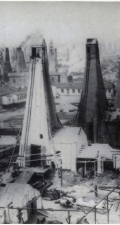
-
Carpet Art & Tradition
Herodotus, Claudius Elian, Xenophon, and many other ancient historians of the world have described the development of carpet making in Azerbaijan throughout history. Traditional Rugs and Carpets made of a local sheep wool have always been a part of everyday life.
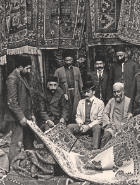
The role and importance of Azerbaijan carpet is reflected in the meaning of the designs and in the way of how the weavers use symbols and ornaments. It was common for young girls to tell fortunes on carpets. Special carpets were woven for medical treatment, for wedding ceremonies, the birth of a child, mourning rituals, and prayer. Until the early 20th century, Azerbaijan carpet had an important position on the world market.
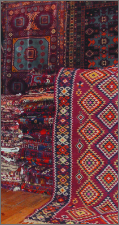
-
Baku Old & Contemporary
Rapidly growing Baku is full of contrasts: impressive skyscrapers and stunning modern architecture are located next to Isheri Sheher – the old town with cobblestoned streets, ancient city.
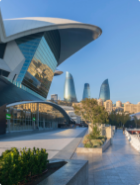
A short walk in Baku and its seaside boulevard will make you venture into the centuries’ old history of Baku, the capital of Azerbaijan. Stroll through its streets and be amazed by the contrasts of the city’s architecture. Walk From 12th century Maiden Tower to Shirvanshah Palace of the 15th century. From typical districts of the Soviet Era buildings to beautiful mansions and palaces of the late 19th century and finally to modern buildings and skyscrapers.
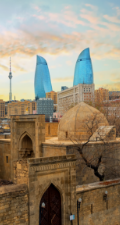
-
- Getme, Getme
- Bayati Shiraz
- Ateshim var Kulum
- Bayatilar Segahi
- A Trace of Grace
Mugham Music
Mugham is music, philosophy, and a unique meditation that expresses complex, emotional meaning, deep and comprehensive thinking. Mugham strengthens and caresses the spirit of the Azerbaijani people.
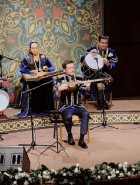

No matter where you are in Azerbaijan, you will find a most hospitable and warm welcome accompanied by the famous Mugham music. It’s a centuries-old Azerbaijani musical tradition based on folklore and oral histories, passed down from generation to generation. Azerbaijani Mugham is characterised by a unique and melancholic sound, with creative improvisations conjuring an endless variety of artistic expression.

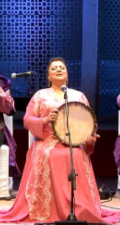
-
Black gold of the Caspian Sea
While in Azerbaijan, be sure to enjoy the unforgettable taste of the local caviar. Rare, expensive, and cherished as a delicacy, the caviar of the sturgeon of the Caspian Sea has an untouchable reputation and is highly prized in modern haute-cuisine restaurants.

A favourable environment and chemical composition of waters made the Caspian Sea the perfect habitat of sturgeon, the most-valuable fish breed in the world. The local caviar, often referred to as “black gold”, is traditionally taken from sturgeon, a Caspian delicacy which, since it became popular in the 17th century, has been known worldwide as a luxury product, supplied to Europe’s royal courts, Michelin-starred restaurants, and fishmongers everywhere.

A Selection of Azerbaijani Cuisine
It doesn’t matter if you are in mountains or lowlands, in Azerbaijani cuisine is somewhat similar to the traditions of the Caucasian and Central Asian peoples but has its distinctive features. It is remarkable by its abundance of every possible meat, fish, and vegetable dishes (except pork) dressed by fragrant greens and spices. The national food range also includes many dishes from rice, flour, vegetables and greens, widely uses such domestic spices as caraway seeds, fennel, anise, bay leaf, etc.
A Selection of Azerbaijani Cuisine
-

Lavangi
Delicious casserole of chicken stuffed with walnuts and herbs. It’s supposedly a specialty of the Talish region of South Azerbaijan, but it is very difficult to find in restaurants.
-

Lyulya Kabab
A mixture of minced lamb, herbs, and spices squeezed around a skewer and barbecued, often served in lavash – sheets of unleavened bread.
-

Piti
A soupy stew of mutton, fat, chickpeas, and saffron, cooked and served in individual earthenware pots. Spoon it out into your bowl and mop up the juices with plenty of bread.
-
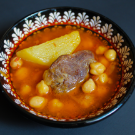
Parcha-Bozbash
The word ‘parcha’ means a part or a chunk, whilst the word ‘bozbash’ translates from Azerbaijani as a grey chunk or a grey part because the meat turns grey whilst cooking.
-

Pakhlava
One of the festive sweets that are baked for the Novruz Holiday to honour the Sun. The name derives from the Azerbaijani carpet’s rhombic shape decor called ‘pakhla’, which symbolizes fire.
Azerbaijani cuisine is somewhat similar to the traditions of the Caucasian and Central Asian peoples but has its distinctive features. It is remarkable by its abundance of every possible meat, fish, and vegetable dishes (except pork) dressed by fragrant greens and spices. The national food range also includes many dishes from rice, flour, vegetables and greens, widely uses such domestic spices as caraway seeds, fennel, anise, bay leaf, etc.
While in Azerbaijan, don’t miss a traditional dinner party; enjoy the local hospitality, feed your body with the local delicacies and your soul with the deep sounds of Mugham music.

Night view of Baku

Baku old city

Downtown of Baku

Mud Volcanno

Carpet shipping in Baku old city

Heidar Aliyev Center.

Shemakhi tombs

Shirvanshah’s Palace, Baku

Mauntain village Khinalig
... the country full of colours
The rich historical and cultural heritage, untouched nature, ancient and modern architecture, unique
culture, cuisine and more…
Visit the millennia-old art of petroglyphs and explore rich museum collections. Be immersed in the vibrant Baku life and get acquainted with ancient traditions well preserved in remote villages still breathing with the past…
Azerbaijan will inspire you to explore this land full of contrast and beauty from an imaginary flying carpet on the edge of the sky.
CLICK TO SEE OUR MOST WANTED TOURS EXPLORING AZERBAIJAN













